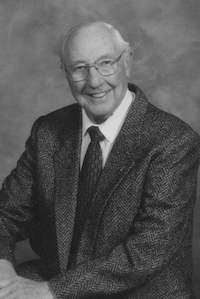Herb Lapp was born and raised on a farm at Alameda, Saskatchewan. He served in the Royal Canadian Air Force as a pilot during World War II. In 1949, he graduated in Agricultural Engineering from the University of Saskatchewan. In 1962, he obtained an M.S. in Agricultural Engineering from the University of Minnesota. Herb married Alba Dunnigan also of Alameda; they raised a daughter Cheryl and two sons, Ronald and Richard.
Following graduation, Herb worked for the Prairie Farm Rehabilitation Administration (PFRA) developing irrigation and water storage projects. He then spent two years with the Manitoba Department of Agriculture as an extension engineer. In 1953, Herb joined the Faculty of Agriculture, University of Manitoba, as a Professor in the Department of Agricultural Engineering. As Head of the Department from 1957 to 1967, Herb’s duties included teaching, research, administration, extension and foreign service. He supervised numerous graduate students, many of whom were from international countries. As well, he authored or co-authored 13 scientific papers.
Professor Lapp’s research included experiments in field tillage, seeding methods, grain drying and alternate energy sources. He coordinated a major project to determine the feasibility of producing energy from the anaerobic digestion of animal manure. This research, which gained international recognition, led the way to the production and use of ethanol as a fuel in North America.
Working through the Colombo Plan and CIDA, Herb assisted in the development of a new University in Khon Kaen, Thailand, and the establishment of a Faculty of Agricultural Engineering. Besides teaching engineering students, Herb’s responsibilities included teaching English to staff and students; planning and designing buildings, laboratories and a research farm; budgeting; and selecting students for graduate training in Canada.
Herb also worked with the United Nations Food and Agriculture Organization (FAO) in Peru where he established a graduate program at the National Agrarian University in Lima. Having learned to speak Spanish, Herb was able to teach in Peru. Over his long career, Prof Lapp visited many developing countries where he helped modernize agricultural practices and irrigation techniques. Some of the countries he visited while working on projects for the World Bank, the Colombo Plan, CIDA and FAO included Ethiopia, Honduras, India, Nigeria, the Philippines, and Sri Lanka.
Herb was named a Fellow of the Canadian Society of Agricultural Engineering in 1978 and in 1980 he was given the Society’s Maple Leaf Award for outstanding contributions in Agricultural Engineering in Canada. In 1971, Herb helped found the non-profit Biomass Energy Institute in Winnipeg.


